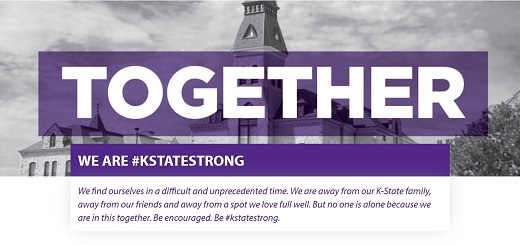06/24/20
K-State Current - June 24, 2020
K-State Current is a weekly news update for the Kansas Board of Regents to apprise the Regents on a few of the many successes and achievements made by K-State faculty, staff and students.
K-State News
Visit K-State’s “We Are #KStateStrong” site to view brief videos designed to keep the K-State family engaged, connected and inspired during these challenging times.
Work to help first-generation students earns university national distinction
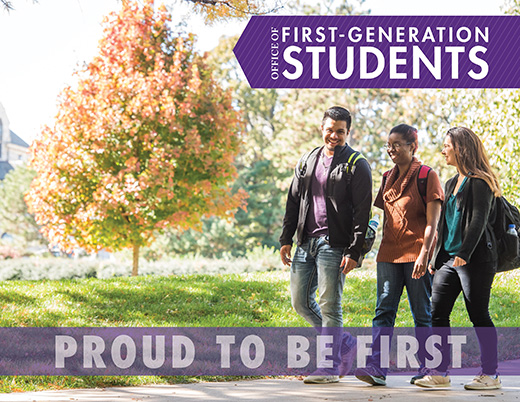 Kansas State University is among a select group of schools being recognized for its efforts to help first-generation college students succeed with its selection for the inaugural cohort of First Scholars® Network institutions.
Kansas State University is among a select group of schools being recognized for its efforts to help first-generation college students succeed with its selection for the inaugural cohort of First Scholars® Network institutions.
K-State is one of 31 institutions to earn the select honor, made by the Center for First-generation Student Success, an initiative of NASPA — Student Affairs Administrators in Higher Education and The Suder Foundation, for demonstrating a commitment to advancing the outcomes of first-generation students through improving both first-generation student success initiatives and approaches across the university. As part of the First Scholars Network, K-State gains access to expertise and proven strategic tools from the Center for First-generation Student Success and will learn and share about successful programs and strategies from other network members.
"As a land-grant institution, K-State's commitment to student access, especially first-generation student access, is in our DNA," said Jeannie Brown Leonard, the university's vice provost for student success. "Through our association with the First Scholars Network, we can share our successes in serving first-generation college students and continue to innovate and integrate our work across campus. It is an honor to engage with a community of higher education leaders committed to using data and promising practices to promote first-generation student success."
First Scholars supports institutional desire to scale programmatic initiatives to support first-generation students throughout the student lifecycle and beyond. First Scholars aligns clearly defined, measurable goals with institutional data to identify gaps, track progress and create systems allowing leadership to make informed choices resulting in improved student outcomes, strengthened enrollment management, collaborative programming, and preservation of resources.
"The landscape of first-generation student initiatives is continually shifting alongside the ever-changing needs of our communities, nation and global society," said Sarah E. Whitley, senior director of the Center for First-generation Student Success. "As part of the First Scholars Network, Kansas State University will become a key partner in driving systemic change and looking to the future of first-generation student success."
K-State is demonstrating its commitment to first-generation student success in a variety of ways. The university created the Office of First-generation Students in summer 2018. Since then, the office has hosted annual first-generation student graduation recognition events and created a lounge for first-generation students in Holtz Hall with the help of a donation from Phillips 66.
Through collaborations with K-State First, K-State's first-year student success programs, two CAT — Connecting Across Topics — Communities for first-generation students focusing on skill building, leadership and the transition from high school to college were created. In partnership with the Academic Coaching program in the Academic Achievement Center, all first-generation students have an opportunity to meet one-on-one with an academic coach. First-generation students who met with a coach a minimum of three times during a semester increased their GPA by half a point.
College-specific and TRIO programs on all K-State campuses continue to play a vital role in supporting first-generation students not only during their undergraduate studies but beyond through research and graduate school preparation.
K-State and the other First Scholars institutions will partner with the Center for First-generation Student Success for a two-year experience and receive the following:
• Expert guidance and tailored resources converging to support systemic transformation and provide on-time, first-generation thought-leader expertise.
• An integrated framework that combines evidence-based and targeted solutions to propel systemic transformation and confidently scale holistic student support across the academic career of first-generation students.
• Robust inventory, assessment and reporting structures focused on first-generation student support and institutional cultural shifts.
• Scalable initiatives and programmatic toolkits customizable to the institution that address the immediate needs of administrators and practitioners.
• Structured, cross-collaborative learning with institutional partners from across the higher education landscape.
"First Scholars provides a unique balance of bringing first-generation student initiative scaling into focus while drilling down into how K-Staterecalibrates institutional systems to elevate potential and advance outcomes for first-generation students, said Kevin Kruger, president of NASPA president. "This approach positions K-State to be a leader in first-generation student success."
To learn more about first-generation efforts at K-State, visit k-state.edu/firstgen. To learn more about First Scholars and the Center for First-generation Student Success, visit firstgen.naspa.org.
Applied Park Science Lab announces partnership through National Park Service contract
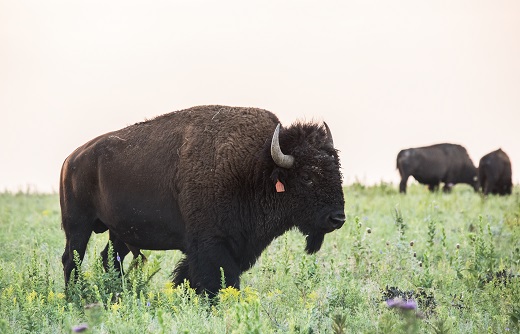 The Applied Park Science Lab in the horticulture and natural resources department will work on improving national parks as a collaborator on a $40 million contract from the U.S. National Park Service.
The Applied Park Science Lab in the horticulture and natural resources department will work on improving national parks as a collaborator on a $40 million contract from the U.S. National Park Service.
The lab will study visitor use and social issues for nationwide research projects conducted to assist with park service planning and management. The Institute for Tourism and Recreation Research at the University of Montana, Otak of Redmond, Washington, and RRC Associates of Boulder, Colorado, are the leads on the five-year N.P.S. contract.
The Applied Park Science Lab will be specifically available to assist with:
- Understanding in-park visitor use so land managers can make better decisions on visitor experiences and resources protection.
- Studying recreation, transportation and carrying capacity issues, including visitor movement, travel pattern studies, visitor use level estimation and evaluations of conditions with changes over time and under various use levels.
- Conducting non-visitor studies to look at visitor displacement and increase awareness of gateway communities and regional stakeholders, as well as studying potential visitors to assist in future management decisions.
The APS lab at Kansas State University will join researchers from Utah State University, Oregon State University, University of Colorado, University of Florida, University of Georgia, University of Maine and Virginia Polytechnic University.
K-State Faculty Highlights
Sauer assumes president-elect role for Academy of Nutrition and Dietetics
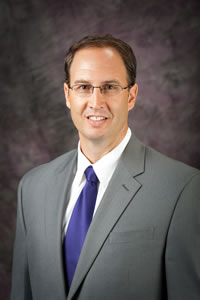 On June 1, Kevin Sauer assumed the role of president-elect for the Academy of Nutrition and Dietetics, the world's largest organization of food and nutrition professionals. He will serve as the 96th President in 2021-2022 and is the third faculty member from K-State to serve in this prestigious role. The most recent person to serve in this capacity, via the former American Dietetic Association, was Grace Shugart, just over 50 years ago.
On June 1, Kevin Sauer assumed the role of president-elect for the Academy of Nutrition and Dietetics, the world's largest organization of food and nutrition professionals. He will serve as the 96th President in 2021-2022 and is the third faculty member from K-State to serve in this prestigious role. The most recent person to serve in this capacity, via the former American Dietetic Association, was Grace Shugart, just over 50 years ago.
Sauer is a professor in the department of food, nutrition, dietetics and health, College of Health and Human Sciences, and co-director of the national Center for Food Safety Research in Child Nutrition Programs. He specializes in administrative dietetics and has previous experience in health care food and nutrition services, school nutrition and university dining. Sauer is an accomplished educator and researcher who has been honored locally and nationally for his work including the K-State Presidential Award for Excellence in Teaching, the Kansas Academy of Nutrition and Dietetics’ 2015 Distinguished Dietitian of the Year Award, the 2019 Mentoring Award and the Outstanding Educator Award. His extensive service to the Academy includes being a former chair of the Commission on Dietetic Registration and the CDR's Examination Panel as well as the chair of the 2020 CDR RDN/NDTR Entry-Level Practice Audit. He was adirector at-large on the Academy’s Board of Directors in 2017-2020 and served on the Council on Future Practice; House of Delegates Evolution Design Team; Council on Research; Nutrition and Dietetics Educators and Preceptors Council; Research Priorities and Development Task Force; Code of Ethics Revision Task Force and the Academy Foundation’s Healthy and Sustainable Food Systems collaborative. He earned his undergraduate, master’s and doctoral degrees from K-State.
The Academy of Nutrition and Dietetics was founded in Cleveland, Ohio, in 1917, by a visionary group of women dedicated to helping the government conserve food and improve the public's health and nutrition during World War I. Today, the Academy represents more than 100,000 credentialed practitioners — registered dietitian nutritionists, dietetic technicians, registered, and other dietetics and nutrition professionals holding undergraduate and advanced degrees in nutrition and dietetics, and students — and is committed to improving the nation's health and advancing the profession of dietetics through research, education and advocacy.
Members of the Academy play a key role in shaping the public's food choices, thereby improving its nutritional status, and in treating persons with illnesses or injuries. Members offer preventive and medical nutrition therapy services in a variety of settings. As a leader in food and nutrition issues, the Academy provides expert testimony at hearings, lobbies Congress and other governmental bodies, comments on proposed federal and state regulations, and develops position statements on critical food and nutrition issues.
Comer's CAREER grant a first for College of Veterinary Medicine
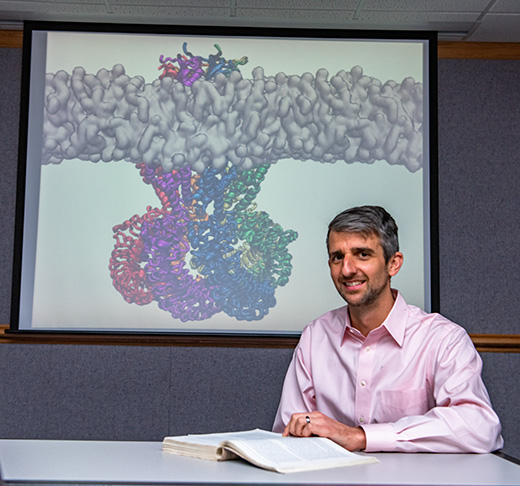 A Kansas State University researcher is the first in the College of Veterinary Medicine to receive a CAREER award from the National Science Foundation.
A Kansas State University researcher is the first in the College of Veterinary Medicine to receive a CAREER award from the National Science Foundation.
Jeff Comer, associate professor of anatomy and physiology, has received a $450,513 award from the NSF Faculty Early Career Development, or CAREER, Program. The grant period is for five years. Depending on funding availability and scientific progress of his project, funding could be increased by $115,344 in the fifth year, bringing the total of the award to $565,857.
The CAREER program offers the NSF's most prestigious awards in support of early-career faculty who have the potential to serve as academic role models in research and education, and to lead advances in the mission of their department or organization.
"The NSF CAREER program is different from other NSF grants in that it is not only a research grant but also is meant for academic career development of the faculty," Comer said. "As such, it includes a substantial educational component along with the research."
"Dr. Comer works at the intersection of biology, physics and mathematics," said Hans Coetzee, professor and head of the anatomy and physiology department. "His groundbreaking research uses innovative computational methods to solve contemporary biological problems. He has leveraged these skills to establish productive interdisciplinary collaborations with many of our faculty with a traditional biomedical research focus. We are fortunate to have Dr. Comer at K-State and we are proud of his recent NSF award."
The CAREER award funds Comer's research using computer simulations and complementary experiments to design protein-like molecules that can easily be programmed to arrange themselves into complex devices for biomedical applications such as diagnostic tests.
"The miniaturization of devices such as computers and cellphones has been so successful that the size of their parts is now similar to the size of molecules and atoms," Comer said. "Soon, the old ways of building things will no longer work. The future is building things out of individual molecules. It is as if we are going from building sandcastles to building tiny castles out of individual grains of sand."
His research team also seeks to develop computer simulations of molecules for use in college classrooms and in K-12 outreach. These simulations will give students a better understanding of how molecules move.
"The interactive simulations will be aimed at helping students understand how medicines work and how new medicines can be designed," Comer said. "The educational modules and simulation programs will be made freely available to educators and the public, and will include English- and Spanish-language versions."
K-State Student News
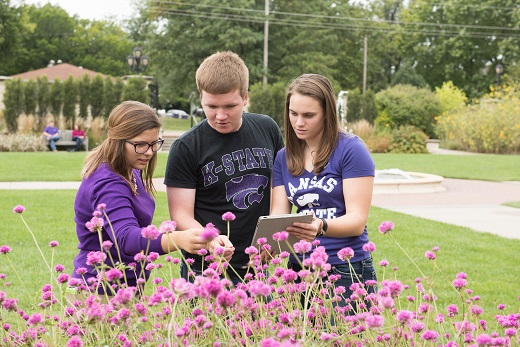 Several College of Agriculture faculty and graduate students were recently recognized for their teaching efforts at the annual North American Colleges and Teachers of Agriculture, or NACTA Conference, which was hosted virtually this year. A major focus and intent of the society is to recognize individuals whose efforts represent the very best in agricultural higher education.
Several College of Agriculture faculty and graduate students were recently recognized for their teaching efforts at the annual North American Colleges and Teachers of Agriculture, or NACTA Conference, which was hosted virtually this year. A major focus and intent of the society is to recognize individuals whose efforts represent the very best in agricultural higher education.
Adam Ahlers, associate professor in horticulture and natural resources, and Colby Moorberg, assistant professor in agronomy, were both recognized with NACTA Educator Awards. The award is a criterion-based award, reviewed by a committee that evaluates the nominee based on criteria such as teaching philosophy, student evaluation summary, nominee's teaching activities and supporting letters from peers and administrator.
Three graduate students were also recognized by NACTA with a Graduate Student Teaching Award: Michael Brunson, doctoral student, and Karen Schneck, master's student, both in horticulture and natural resources; and Jake Ziggafoos, a master's student in agronomy. The award is given to graduate students who are active in classroom instruction and demonstrate excellence as teaching assistants in agriculture disciplines. Nominees are reviewed by a committee of NACTA members and are evaluated based on the graduate student's teaching philosophy, their involvement in teaching outside the classroom, self-evaluation, support letters from supervising faculty, administrator and student recommendations.
